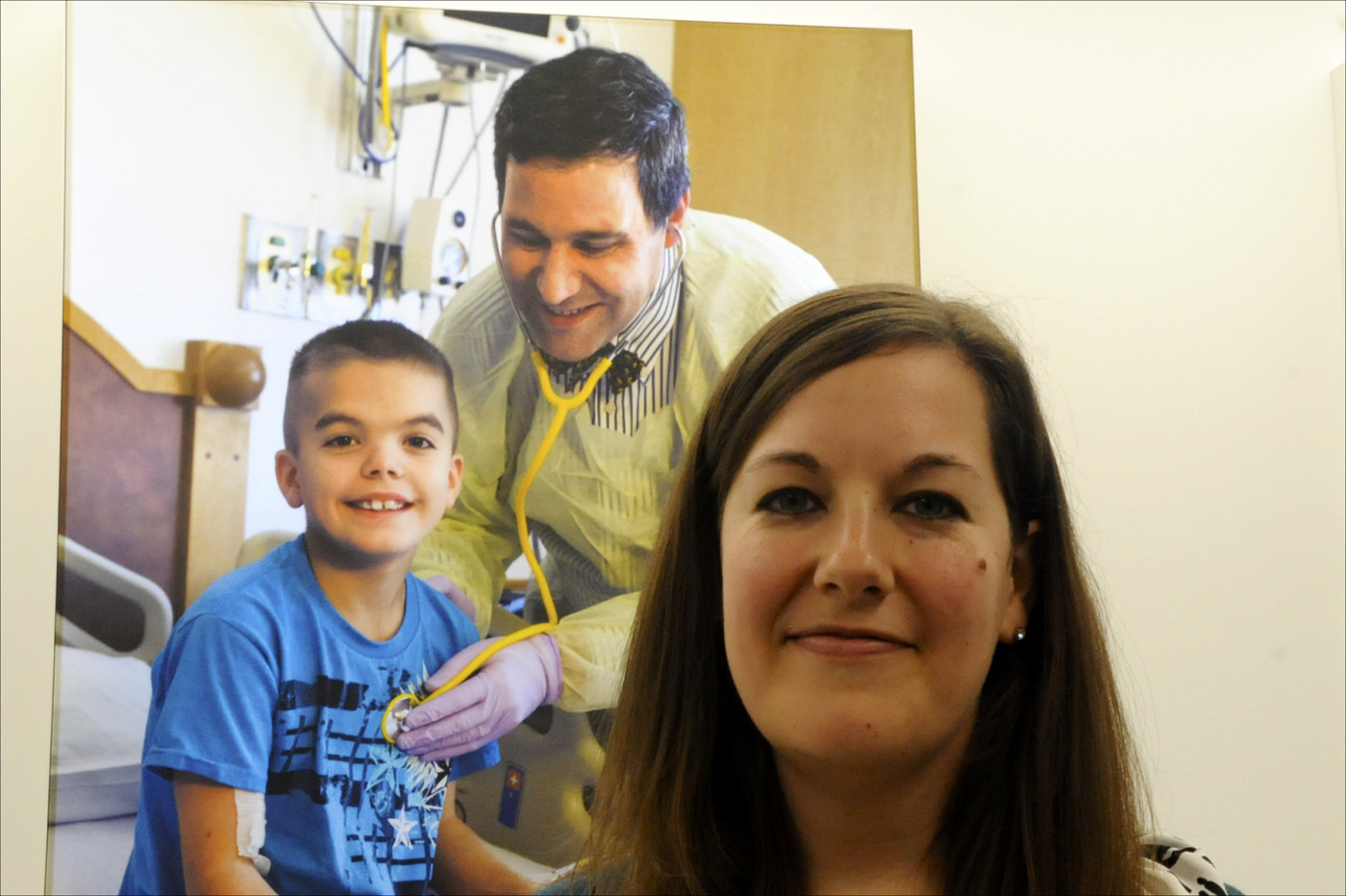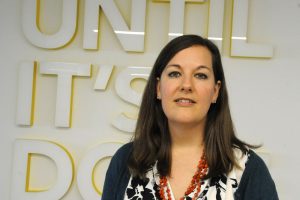Cystic Fibrosis Foundation Helps Patients Through Insurance Maze, and Even with Hurricanes
Written by |

Anne Willis, senior director of policy and advocacy at the Cystic Fibrosis Foundation in Bethesda, Maryland. (Photos by Larry Luxner)
More adults than children are living with cystic fibrosis for the first time ever, says the Cystic Fibrosis Foundation (CFF).
This means more patients are encountering issues they have never had to face — such as saving for their children’s college and their own retirement.
They are also having to deal with an increasingly confusing healthcare system that can require hours on the phone with insurance companies.
Anne Willis, the CFF’s senior director of policy and advocacy, says her organization is here to help with the insurance challenges. The foundation also helps patients and their families deal with the consequences of hurricanes, wildfires, and even homelessness.
The insurance assistance is especially important now, because open enrollment for Affordable Care Act health insurance for 2018 is in full swing. The enrollment period started on Nov. 1 and runs to Dec. 15.
“With constant changes in the [insurance] marketplace, it’s complex and difficult to navigate,” Willis said at last month’s Rare Diseases & Orphan Products Breakthrough Summit. The National Organization for Rare Disorders sponsors the annual event in Washington.
“It’s an overwhelming time burden for CF patients to do their treatments and have to deal with insurance and other life issues,” Willis said. “We’re seeing an increase in people having trouble meeting their basic living expenses. We’ve also seen a lot of food insecurity issues. People with CF need extra calories, but those who have finally made it to adulthood are not going to be focused on their care if they don’t have a place to live.”
Recent disasters — from Category 4 hurricanes in Texas and Florida to devastating wildfires in California — have worsened living conditions for many people with CF, a progressive genetic disease that can lead to persistent lung infections.
New issues confront CF patients
In an interview at CFF headquarters in the Washington suburb of Bethesda, Maryland, Willis said her nonprofit group has seen “amazing improvements” in CF treatments since its founding in 1955.
But the insurance challenges patients face have become more daunting.
“Things happen when you become an adult,” Willis told Cystic Fibrosis News Today. “For example, you might decide whether to go to college. Do you get married? If so, do you go to your spouse’s health plan? If you’re under 26, should you stay on your parents’ plan? We’re seeing that people have to deal with a whole host of issues that affect their ability to access healthcare.”
Last year, the foundation spent $307 million on medical programs, education and community services, up from $223 million in 2015. About 200 people work at its Bethesda headquarters. The foundation has more than 80 chapters spread across the United States.
The organization invested in 51 clinical trials during 2016. It also funded 26 treatment discovery and development programs — more than double the amount in 2012, according to a CFF brochure. Altogether, 34 CF therapies it is funding are in the development pipeline.
The U.S. Food and Drug Administration approved Vertex Pharmaceutical’s Orkambi (lumacaftor/ivacaftor) combination therapy as a CF treatment in September 2016 as a CF treatment. The combo is for children ages 6-12 whose CF stems from a F508del gene mutation.
This summer, the FDA broadened the approval it had given to another Vertex therapy, Kalydeco (ivacaftor), to include 23 additional mutations of the CFTR gene that causes CF. This brought the total number of mutations the drug can treat to 38 out of the 2,000 or so known mutations of the gene.
CFF spokeswoman Emily Kingsland said these and other treatments have led to a dramatic jump in life expectancy for the 30,000 Americans with the disease.
“In the 1950s, CF was a pediatric disease, and people were not expected to make it to kindergarten,” she said. “Now, they’re living into their 40s, 50s and beyond. A couple of years ago, we reached a milestone: 50 percent of our patients were adults, and 50 percent children. That’s a huge shift in the disease, and it represents amazing progress.”
But Orkambi costs $272,000 a year, and Kalydeco even more: $311,000. This means healthcare coverage is critical to ensuring that all who need a therapy can get it.
Compass: Free insurance assistance
The foundation started its Compass program to help patients through the maze of insurance, legal and financial issues they and their families can face these days. There’s no charge for the service, and it doesn’t matter what kind of income patients earn, or where they live, Willis said.
An indication of the need that’s out there is that Compass’ caseload has jumped 128 percent in the past year.
“Last year, during open [insurance program] enrollment, we helped about 300 people understand what their options were,” Willis said. “We have a team of case managers ready to walk people through the prices.
She added that “with CF, it’s so important to make sure health plans cover all of their needs. What are out-of-pocket costs? What about home healthcare? What about hospitalization? It’s very complicated, even for folks on my team who do this for a living.”
In 2016, doctors associated with the foundation met with public and private insurers in 22 states to discuss CF patients’ needs.
CF patients should make sure that their insurer covers the care centers and physicians they want to see — and the kinds of medication they need. They should also make certain that their insurer covers hospitalization and any home healthcare services they need.
“It’s not always easy to understand what the cost of a particular plan will be,” Willis said. “You have to look at a variety of factors. Sometimes, going with a low [monthly] premium is not the best option. Our case managers will help people go onto the marketplace, find their plans, and walk them through the different components of each plan and compare them.”
Helping families in times of need
Willis said healthcare jargon is confusing in any situation — but “when you have CF, you’re dealing with a lot of other things. Our team can get on the phone and talk with the insurance company. That can involve a lot of time.”
While the foundation doesn’t offer financial assistance, Compass can connect patients with programs that pay for drugs, vitamins, supplements, genetic testing, insurance premiums and out-of-pocket expenses.
The patients the organization has helped this year include more than 20 families whose lives were disrupted by hurricanes.
“We also worked with a family who lost access to water because of the drought in California,” Willis said. “They didn’t have a lot of money and didn’t know what to do. We were able to reach out to a community organization that gave them some money to help them bring in a temporary 2,000-gallon water tank.”
In another area, a power utility — citing nonpayment of an overdue electric bill — pulled the plug on a family with a 4-week-old baby who has CF. “We worked with an organization that gave them $400, and got their electricity turned back on,” Willis said.
In yet another example, an elderly woman who had custody of her grandchildren — one of whom was a CF patient — was living in a tent in the woods.
“Imagine, you have no electricity, meaning you can’t do breathing treatments or keep medications cool,” Willis said. “We were able to work with that family and connect them with housing so that they didn’t have to live in a tent anymore.”







